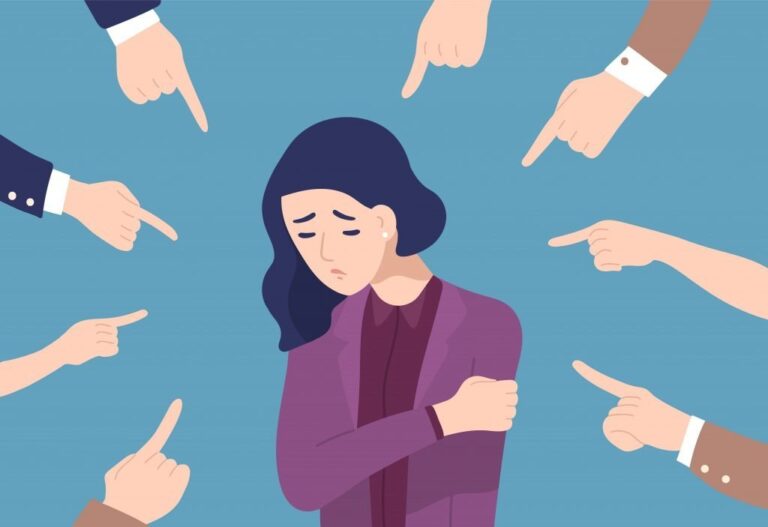Victim blaming occurs when the victim is held fully or partially responsible for the crime or incidents committed against her, and this blaming appears in the form of negative social responses from the media, family members, acquaintances, the surrounding community and even from professionals in legal, medical and mental health as well. These reactions are often based on misunderstanding by others that make them believe that the victim deserves what happened to them, and as a result of this blame it becomes difficult for victims to cope and recover from what happened to them (1).
But does the gender of the judges contribute to shaping their attitudes? Yes and no, because in this case the results were conflicting, Some studies have shown that women are less blaming the victim and attribute greater responsibility to the aggressor than men, and this can be explained by the fact that men are less able to understand the female victim’s perspective, while women identify with the victim and see that this incident may be repeated with them.
However, in other studies, women have found that women hold the victim more responsible than men, and this may be due to their need to distance themselves from the victim and their desire to feel that they are able to control the violence in which the victim was involved (2), and as a result they may be tempted to believe in the just world hypothesis that the victim deserved what happened to her.
That is, I was hurt because of a sin I committed because everyone happens to him what he deserves, because the world is just as they think, and thus they try to feel safe and protected and distance themselves from the possibility of the same crime against them in a society that may not be just (1,2).
Hence, we find that some individuals resort to blaming the victim to enhance their sense of safety, such as blaming the victim based on her personal characteristics and considering her a reason for the crime that occurred with her and her justification for the aggressor, so the blame may come from the victim’s close circles such as family members and friends in order to reassure themselves, the victims They are a reminder of our vulnerability. We don’t want to think that we can lose control of our lives and bodies, so blaming the victim for what happened to her creates a false sense of security, and this reassures individuals that they will be immune if they do not act as the victim did at the time of the accident (1).
Essentially, people’s attitudes toward gender equality shape their attitudes toward the victim and perpetrator of sexual crimes, Because having traditional views of women and their roles increases the blame on the victim if she is female, unlike those who have non-traditional views, they are more supportive of the victims (2).
It seems that blaming the victim and holding them responsible is not limited to public opinion and ordinary individuals, but rather has an impact on legal decision-making, There is leniency and prejudice in cases of sexual assault, and judgments are affected by the extent of the victim’s relationship with the offender, whether from close relatives, acquaintances or strangers, so the blame increases on the victim and less on the offender as the relationship between the two approaches, as well as affected by the victim’s situation during the incident, whether she was fully conscious or under the influence of alcohol In such cases, the offender is less likely to be found guilty, and there is a tendency to hold women responsible for accelerating sexual assaults which is a common aspect of legal decision-making, and the stereotype of “real sexual assault” of a stranger violently attacking an unsuspecting victim contributes to direct and rapid victim blaming. In cases contrary to this well-established image in mind.
In conclusion, the culture of victim blaming does not contribute to solving the problems of violence and sexual crimes, nor does it protect the victims from further abuse. On the contrary, it delays the victims’ recovery and adaptation after the accidents they have been exposed to, and allows the perpetrators to persist in increasing and continuing crimes and finding justifications for this, as well as spreading the fear of disclosing Incidents that victims may be exposed to in the future, taking into account the defamation that the victim may be exposed to in the event of an allegation, and taking the necessary measures against the perpetrators, which may enhance the silence of the victims and keep cases of sexual assault and violence in the shadows.
Sources:
1. Victim blaming [Internet]. Canada: The Canadian Resource Center for Victims of Crime 2009 : Here
2. Brems C, Wagner P. Blame of Victim and Perpetrator in Rape versus Theft. : Here
3. De Judicibus M, McCabe M. Blaming the Target of Sexual Harassment: Impact of Gender Role, Sexist Attitudes, and Work Role. : Here
4. Suarez E, Gadalla T. Stop Blaming the Victim: A Meta-Analysis on Rape Myths.: Here
5. Bieneck S, Krahé B. Blaming the Victim and Exonerating the Perpetrator in Cases of Rape and Robbery: Is There a Double Standard?. Here


0 Comments